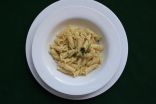(Press-News.org) While the use of antiangiogenesis drugs that block the growth of new blood vessels can improve the treatment of some cancers, clinical trials of their ability to prevent the development of new metastases have failed. Now a study from the Massachusetts General Hospital (MGH) Cancer Center may have found at least one reason why. In their paper published online in the Journal of the National Cancer Institute, an MGH research team reports finding that the growth of metastases in lymph nodes -- the most common site of cancer spread -- does not require new blood vessels but instead takes advantage of existing blood vessels.
"We had previously shown that antiangiogenesis therapies were ineffective in animal models of lymphatic metastasis, but there was no data to explain the mechanism behind those observations," says Timothy Padera, Ph.D., of the Steele Laboratory of Tumor Biology in the MGH Department of Radiation Oncology, senior author of the paper. "Using a novel model we developed to facilitate discoveries about the growth and spread of lymph node metastases, we show that angiogenesis does not occur in lymph node metastases, providing a mechanism for resistance to angiogenic therapy in these situations."
For most types of solid tumors, the presence of lymph node metastases indicates a poorer prognosis and the need for chemotherapy or other systemic treatments that are delivered throughout the body. But the actual role of lymph node metastases in the spread of cancer has been controversial, Padera notes. Some experts believe that it signifies the inherent ability of the primary tumor to spread. Other investigators believe that lymph node metastasis is an essential part of the process leading to metastases in other parts of the body and that metastatic cells in the lymph nodes pass into the bloodstream and seed the growth of new tumors.
To follow up their previous findings that antiangiogenesis therapies could not stop the development or growth of lymph node metastases, the MGH team designed the current study. Using a mouse model of cancer that provides direct microscopic access to lymph nodes, they first found that the initiation and growth of node metastases did not involve the development of new blood vessels. They also found no increase in the levels of angiogenesis-inducing factors or in the expression of angiogenesis-related genes in metastatic lymph nodes. In fact, levels of two antiangiogenesis factors were elevated. Analysis of metastatic lymph nodes from human patients with colon or head and neck cancers also revealed no evidence of angiogenesis.
In the mouse model, treating node metastases with two angiogenesis inhibitors that have different mechanisms of action did not change the density of blood vessels or the growth of the metastases. Finally, comparing lymph node metastases from rectal cancer patients who had been treated with the angiogenesis inhibitor bevacizumab with those from patients that received no antiangiogenesis therapy found no difference in blood vessel density within the metastatic nodes. The researchers also found that lymph node metastases appear to have developed from several different tumor cells that lodged in the nodes, not from a single tumor cell as is the case with many but not all distant metastases.
"The primary implication of our findings is that, since lymph node metastases do not require the development of new blood vessels, antiangiogenic therapy will not inhibit lymphatic metastasis. Other therapies need to be tested for the treatment of patients at risk for lymph node metastasis," says Padera, who is an assistant professor of radiation oncology at Harvard Medical School. "Now we need to answer the question of whether or not lymph node metastases actually can seed distant metastases, which would indicate how aggressively they need to be treated."
INFORMATION:
Co-lead authors of the JNCI paper are Han-Sin Jeong, M.D., and Dennis Jones, Ph.D., of the Steele Laboratory. Additional co-authors are Shan Liao, Ph.D., Daniel Wattson, M.D., Cheryl Cui, Dan Duda, DMD, Ph.D., and Rakesh Jain, Ph.D., Steele Laboratory; and Christopher Willett, M.D., Duke University Medical Center. Support for the study includes National Institutes of Health grant DP2OD008780 and National Cancer Institute grants R00-CA137167n C06-CA059267, P01-CA080124, and R01-CA159258.
Massachusetts General Hospital, founded in 1811, is the original and largest teaching hospital of Harvard Medical School. The MGH conducts the largest hospital-based research program in the United States, with an annual research budget of more than $760 million and major research centers in AIDS, cardiovascular research, cancer, computational and integrative biology, cutaneous biology, human genetics, medical imaging, neurodegenerative disorders, regenerative medicine, reproductive biology, systems biology, transplantation biology and photomedicine.
A good or mediocre appetizer has the potential to significantly change how the main course is enjoyed, according to one Drexel food science professor.
Jacob Lahne, PhD, an assistant professor in the Center for Hospitality and Sport Management, recently found that a comparatively good appetizer could make people enjoy the main course less than if it were preceded by a mediocre appetizer.
Lahne tested and analyzed subjects' hedonic (liking) responses to a main dish of "pasta aglio e olio" (pasta with garlic and oil) after they had either a good or mediocre bruschetta ...
Nature loves crystals. Salt, snowflakes and quartz are three examples of crystals - materials characterized by the lattice-like arrangement of their atoms and molecules.
Industry loves crystals, too. Electronics are based on a special family of crystals known as semiconductors, most famously silicon.
To make semiconductors useful, engineers must tweak their crystalline lattice in subtle ways to start and stop the flow of electrons.
Semiconductor engineers must know precisely how much energy it takes to move electrons in a crystal lattice. This energy measure is the ...
Scientists from UCL (University College London) have designed a chemical compound that has reduced the growth of pancreatic cancer tumours by 80 percent in treated mice.
The compound, called MM41, was designed to block faulty genes. It appears to do this by targeting little knots in their DNA, called quadruplexes, which are very different from normal DNA and which are especially found in faulty genes.
The findings, published in Nature Scientific Reports, showed that MM41 had a strong inhibiting effect on two genes -- k-RAS and BCL-2 -- both of which are found in the ...
Wading bird numbers in the Florida Everglades are driven by water patterns that play out over multiple years according to a new study by the U.S. Geological Survey and Florida Atlantic University. Previously, existing water conditions were seen as the primary driving factor affecting numbers of birds, but this research shows that the preceding years' water conditions and availability are equally important.
"We've known for some time that changes in water levels trigger a significant response by wading birds in the Everglades," said James Beerens, the study's lead author ...
Researchers from The University of Manchester are part of a team that has identified an important new approach to diagnose infections in critically ill patients rapidly and accurately.
A study by colleagues in Salford and Manchester found that chemically analysing breath specimens from patients in intensive care can reveal bacterial infection in the lower respiratory tract of ventilated patients at risk of developing pneumonia.
Although the work is in its early stages, the findings so far look very exciting and could potentially have a huge effect on clinical practice ...
A pioneering new technique to produce high-quality, low cost graphene could pave the way for the development of the first truly flexible 'electronic skin', that could be used in robots.
Researchers from the University of Exeter have discovered an innovative new method to produce the wonder material Graphene significantly cheaper, and easier, than previously possible.
The research team, led by Professor Monica Craciun, have used this new technique to create the first transparent and flexible touch-sensor that could enable the development of artificial skin for use in ...
Researchers at Ludwig-Maximilians-Universitaet (LMU) in Munich have used DNA barcoding to elucidate the diversity of the sponge fauna found in Antarctic waters. The data provide new insights into the evolution of this poorly characterized group.
Sponges constitute an important component of marine ecosystems in the waters around Antarctica. As filter feeders that rely on food particles suspended in the water passing through complex networks of canals lined with flagellated cells, they provide protected niches for many other organisms. "In spite of their considerable ecological ...
How a chimpanzee views a video of an infant chimp from another group being killed gives a sense of how human morality and social norms might have evolved. So says Claudia Rudolf von Rohr of the University of Zurich in Switzerland, lead author of a paper in Springer's journal Human Nature. It provides the first evidence that chimpanzees, like humans, are sensitive to the appropriateness of behaviors, especially those directed toward infants. It also shows that these primates might only take action when a member of their own group is being harmed.
The researchers filmed ...
Working with heart muscle cells from diabetic rats, scientists at Johns Hopkins have located what they say is the epicenter of mischief wreaked by too much blood sugar and used a sugar-gobbling enzyme to restore normal function in the glucose-damaged cells of animal heart muscles.
In addition to much-needed insight into the process of diabetes-related heart damage, the study, described June 24 in the journal Diabetes, offers a clue to a possible treatment strategy for diabetic cardiomyopathy, a condition marked by progressive weakening of the heart muscle found in 60 ...
Nashville, Tenn., June 25, 2015--Collecting and reporting hospital infection data to federal health agencies takes more than 5 hours each day, at the expense of time needed to ensure that frontline healthcare personnel are adhering to basic infection prevention practices such as hand hygiene, according to a recent case study, to be presented on Saturday, June 27 at the 42nd Annual Conference of the Association for Professionals in Infection Control and Epidemiology (APIC).
Infection preventionists (IPs) play a critical role in the effort to eliminate healthcare-associated ...

